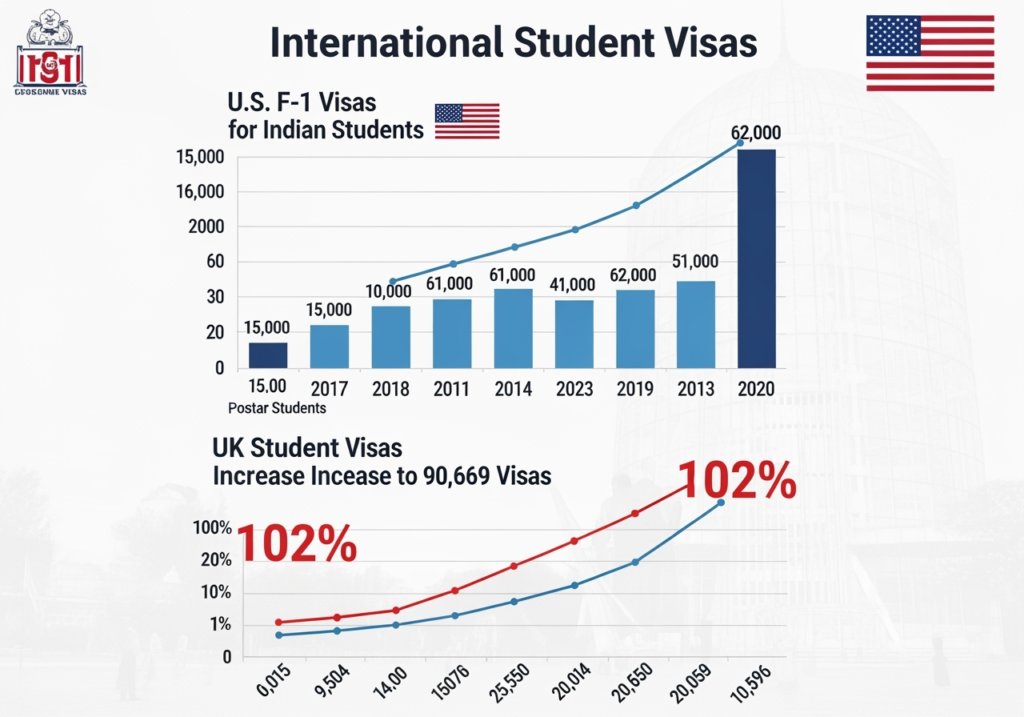Students line up to study abroad after a year of Covid; top destinations include US, UK and Canada

By the end of summer 2021, the US had already issued 62,000 Indian student visas compared to only 15,000 F-1 student visas to Indians between October 2019 and September 2020. Similarly, a total of 90,669 Indians were issued UK student visas in the 12 months ending in September 2021, marking a 102 per cent rise from last year. After multiple lockdowns, closed international borders and financial constraints over the last year and a half, students across the world are once again flocking towards foreign universities for higher education. The recent Cambridge International’s Annual Destinations revealed that despite the impacts of the pandemic, the desire of Cambridge students to continue their higher education overseas has not changed. Over a third of Cambridge students have joined foreign universities amid the pandemic. The survey further highlighted that the top four international destinations globally are the UK, US, Canada and Australia. According to the data shared by study abroad counsellors, the reasons why these destinations continue to attract foreign students could range from quality teaching to better opportunities. INTO University Partnerships recently conducted a global survey with students from 93 countries in August 2021 to understand the impact of the pandemic on the foreign education aspirations and higher education choices of the Gen Z population. It highlighted that the top 3 reasons to choose a university are high-quality teaching (54.4% per cent), availability of scholarships (50.5 per cent) and a high graduate employment rate (46.4 per cent). According to Leap Scholar, an overseas edutech startup, as many as 61 per cent of students who approached the company for counselling for the 2021 admission cycle wanted to study in the UK, followed by 23 and 11 per cent who chose Canada and US, respectively. Co-founder of Leap Scholar, Vaibhav Singh believes that the pandemic is not going to alter the decade long legacies of these countries. “Rankings are not the only parameter for students to choose a university. Many south Asian universities are soaring in the ranking charts but they fail to attract international students. Since English has become the world’s business language, students are automatically drawn to English-speaking countries. 2022 will be the biggest year for study abroad as there is huge pent-up demand due to covid,” Singh said. As per IDP Connect’s New Horizons research conducted in 55 countries, over 39 per cent of respondents chose Canada as their first choice followed by the UK and US (17 per cent). 16 per cent of the participants chose Australia as their first choice. “The US is bouncing back in the new political regime. For Indian students, the most popular driver is post-study work rules. Both Canada and Australia offer liberal courses and easy permanent residency provisions. Despite Australia’s borders being closed amid the whole of the pandemic, it has managed to attract foreign talent because of the recent changes in post-study work visa, which allows students to stay back for three years,” Piyush Kumar, Regional Director (South Asia), IDP Education, said. Fateh Education — an international higher education consulting provider — also received an increase of 60 per cent enquires from last year. CEO Suneet Singh Kochar attributes this increase to the pent up demand due to covid. “The pandemic has slowed down the world but accelerated people’s plans, especially academic. Most students have pursued online courses and upskilled themselves during lockdowns to prepare themselves for the next step. Most preferred countries have post-study work regulations. People do not just pursue a foreign degree, they aspire to build a new life,” Kochar said. US varsities are reporting increased interest from students from across the world. Truman State University received record international student applications for the spring 2022 semester with “numbers doubled as compared to the past”. “While the US remains the top receiving country for international students, the numbers declined over the last several years due, in part, to more restrictive immigration policies, strained international relations and travel bans. The current administration is putting out the welcome mat for international students. We have had a sizable number of deferrals over the last three semesters and we expect that trend to persist into spring 2022 but the number of applications has increased two folds,” said Tim Urbonya, Executive Director of International Education at Truman State University. Diwakar Chandiok, Recruitment Director, South Asia, INTO Universities Partnerships, shares that the increase could be attributed to the relaxations in application requirements. “Many US universities waived off SAT, GRE scores for admissions amid covid. Besides, students were also provided with provisions to arrive late on campus or join the first semester online. Following Brexit, many jobs that were ideally taken up by Europeans have now become available in the market. Hence, more post-study work opportunities are available for foreign students,” Chandiok said. The number of visas issued by the UK and US in 2021 is also proof of the high influx of students. The US government had granted nearly 15,000 F-1 student visas to Indians between October 2019 and September 2020, according to data from the US State Department. This year, there has been a considerable increase as the US had already issued 62,000 Indian student visas by the end of summer 2021. According to recent data shared by UK Home Office, a total of 90,669 Indians were issued student visas in the 12-month period ending in September 2021. Compared with the year ending in September 2020, there is an increase of 45,677, marking a 102 per cent rise in student visas granted to Indians. “As is evident from the visa data, the interest in the UK higher education is increasing year on year – this can be attributed to several reasons – renowned institutions and their legacy, quality professors, life experience and the opportunity to pursue careers in an international hub. However, the graduate route makes it more valuable to pursue higher education in the UK,” said Janaka Pushpanathan, Director South India, British Council.





















